Is investing in shares right for you? What you should know before diving in
Here at Livewire Markets, we write about investing all day long. And because we’re so used to thinking and writing about this stuff, we sometimes lose sight of what it is we’re really talking about.
- What is a stock?
- When did people start carving companies up into small chunks and selling them individually – and why?
- How can you get started as an investor and what should you know before you do?
These questions – and their answers – can easily be lost in the mix as we interview experienced fund managers and professional investors from a whole range of market sectors such as fixed income, listed property, listed infrastructure, private equity and many others.
So, in the following article – adapted from a Perpetual Asset Management Australia brochure, which you can download via the link at the end of this article – we’ve broken down some of the core principles. You might already know all of this, or at least some of it, but this guide may be a handy reference for yourself or someone you care about.
Starting at the beginning
When you buy shares, you’re buying a piece of a company. You’ll receive an annual report and can attend and vote at annual general meetings. Your reward comes in the form of dividends – regular income payments that typically rise or fall in line with the revenue and profits of the company.
You can also be rewarded with capital growth – a rise in the value of your shares. That price rise can result from a range of factors, including:
- The market believes the company’s current operations will generate higher revenues in the future, or that something the company is planning to do – launch a new product, open a new mine, etc. – will generate higher future revenues.
- The market (all those buying and selling shares) believes the dividend income the company is paying (‘the yield’) makes those shares worth more.
- Changes to economic conditions such as interest rates, currencies, economic growth, employment etc., improve the prospects of the company (or make competing investments such as cash, less attractive).
Why would you invest in shares?
People invest in shares because shares have generated real wealth over the long term.
Shares have outperformed
Australian shares have out-performed other asset classes over the past 30 years. We can assess that performance by looking at return histories over decades and business cycles.
Chart 1 below displays the growth of $10,000 invested over 30 years in three asset classes – shares, bonds and cash.
You can see that Australian shares delivered an average annualised return of 9.7% over this long period.
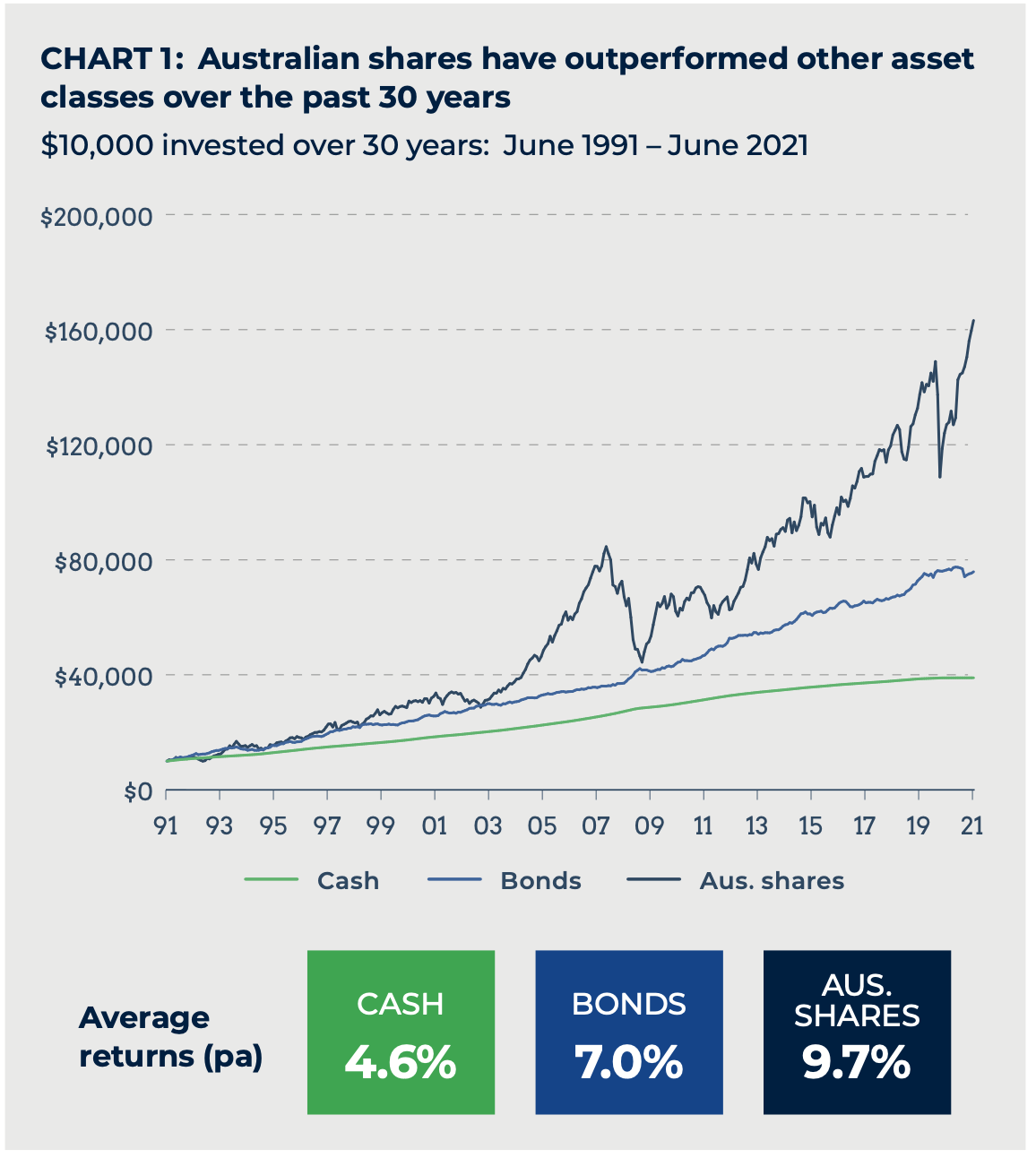
Source: Perpetual & FactSet, as at 30/06/2021. Indices represented by: Cash: Blended Cash Index (90 Day Bills ≤ 30 September 1987 and ≥ 31 October 1987 Bloomberg AusBond Bank Bill Index). Bonds: Bloomberg AusBond Composite 0+ Yr Index. Shares: S&P/ASX 300 Accumulation Index. (Prior to 1 April 2000 the index was the ASX All Ordinaries Accumulation Index.) No allowance has been made for taxation. Past performance is not indicative of future performance.
The real value of income from shares
Different investments pay different levels of income in different ways. Share income has distinct characteristics that may make it particularly valuable to some investors.
Why share income is not predictable
How much a company can pay out as dividends will depend on a whole range of factors including income, expenses, profits, the outlook for all those things and any planned future spending. Even if a company is doing well, it may limit dividends to give it more money to invest in new products or save cash for tough times. It may choose not to pay a dividend at all.
The good news is that the money a company reinvests in the business may turn into greater capital growth for investors down the track.
That’s one reason legendary investor Warren Buffett’s company Berkshire Hathaway pays relatively small dividends – he believes he can earn a higher rate of return on the money the company retains.
In short, while some companies actively try to pay consistent dividends, share income is much less predictable than alternatives like term deposits.
Why share income can be highly tax-effective
Dividends are regarded as income by the government and they will tax you on it. However, as the company also pays tax on this income, this is a form of double taxation. That’s why when you receive a dividend they often come with franking credits, which represent the tax already paid by the company.
This means, in the case of fully franked dividends, you only pay the difference between the company tax rate (usually 30%) and your marginal tax rate. Dividends may also be partly franked or unfranked (which means, they don't come with franking credits).
If your marginal tax rate is below the company tax rate (such is the case for many retirees) then you may even be entitled to a refund. Franking makes owning shares very tax effective.
This may make share income more attractive than that from cash and term deposits, as seen by the higher yield in Table 2.
How franking credits work
Tom is a shareholder in ACME Pty Ltd. Tom receives $700 in dividends. ACME has already paid $300 in company tax (at 30%) and has passed this on to Tom in the form of franking credits, meaning the dividend is fully franked
Tom needs to declare his total income of $700 + $300 = $1,000. As Tom’s marginal tax is 37%, he owes
$370 on this income. However, as ACME has already paid $300, Tom only owes the tax department $70.
If Tom’s marginal tax rate was 0%, he would receive those franking credits as a cash refund at tax time.
Income from shares – how does it compare to other asset classes?
Fixed interest assets – such as bank bills, government bonds or corporate bonds – pay an agreed, fixed amount based on the rate of the bank bill or bond at pre-determined intervals (usually twice a year). At the end of the term, the original investment is also repaid (subject to no default by the bond issuer).
Fixed interest investments are considered lower risk than shares, however, as income from fixed-interest investments doesn’t have tax already paid on it, they don’t have associated tax benefits.
How dividend income is treated differently for tax purposes is shown in Table 2.
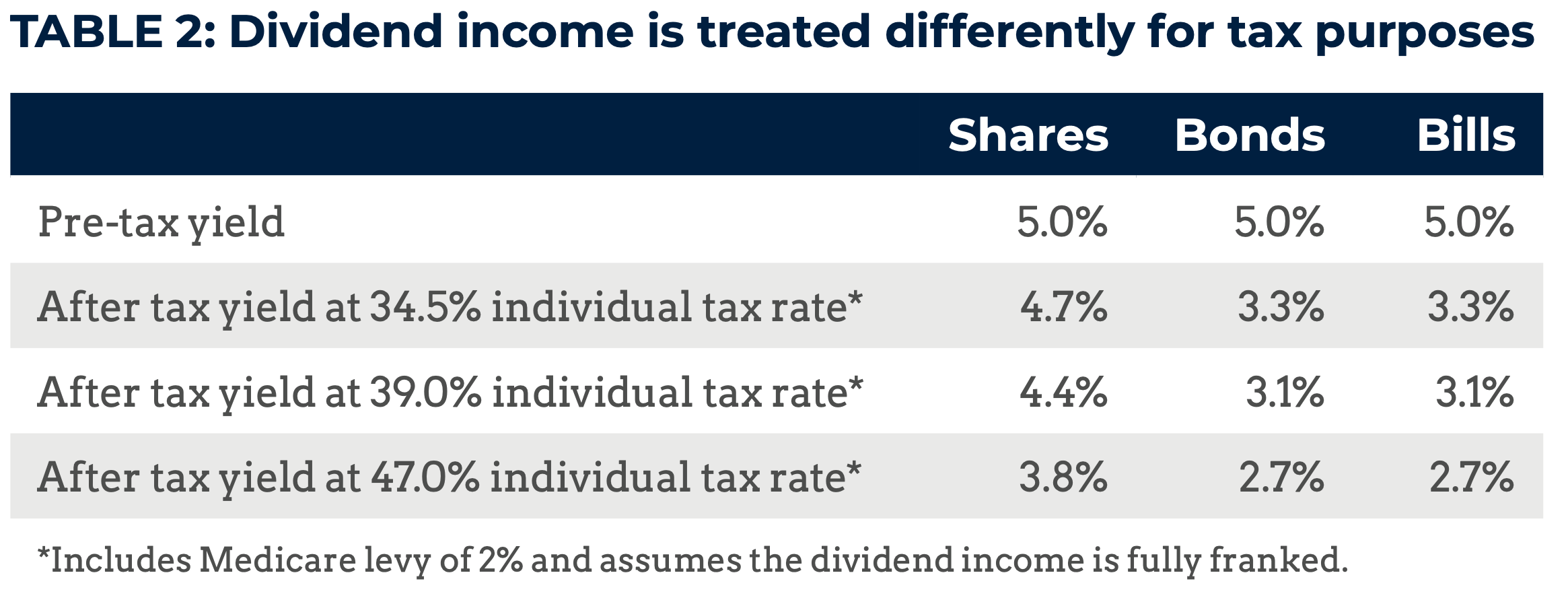
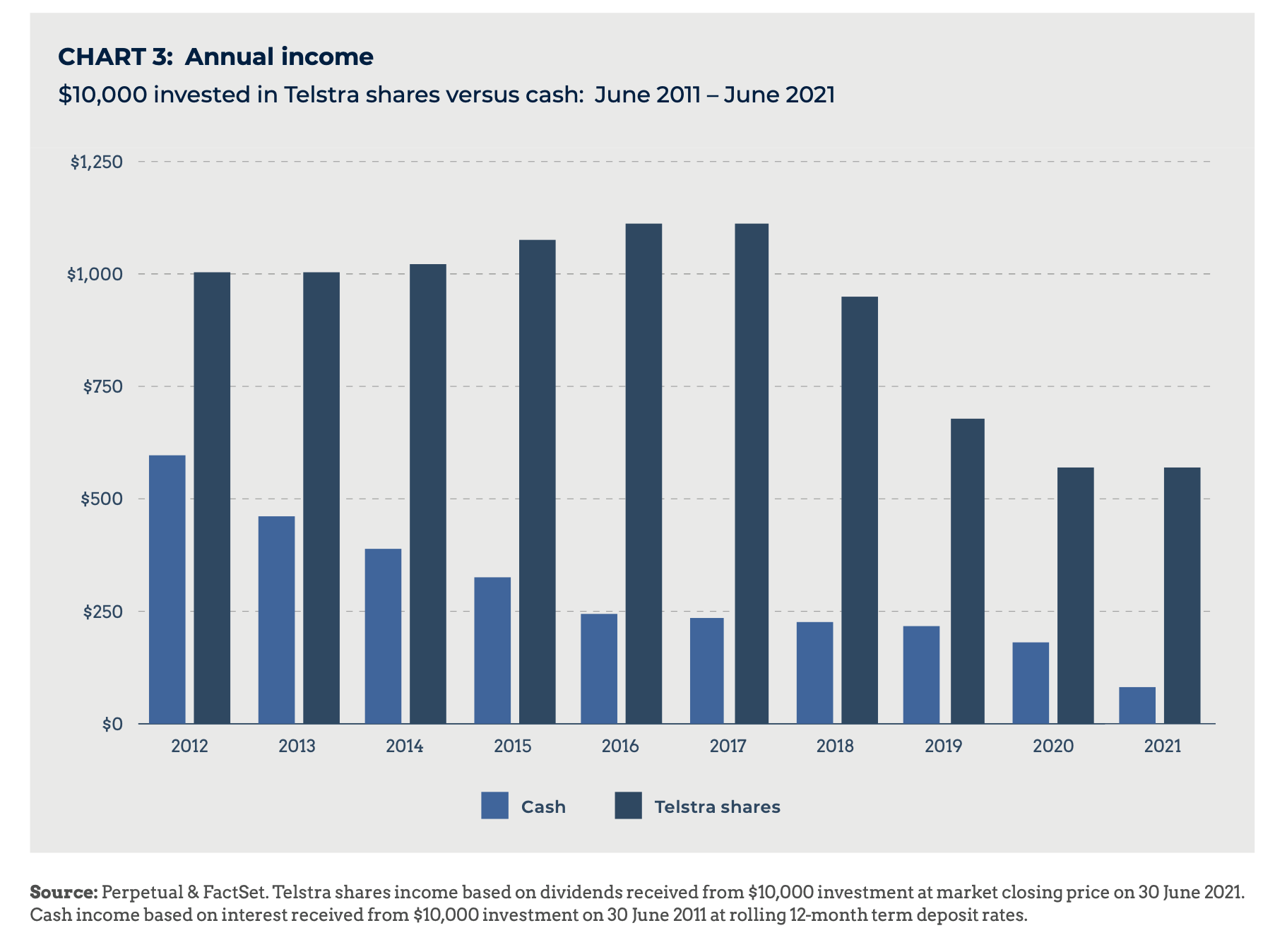
How shares generate a growing income
Term deposits can pay you a consistent income. That’s because term deposit (and bond) income is almost always a set, simple percentage of the capital you invested.
However, when you invest in shares you are investing in a business constantly seeking to grow its revenue.
Whether that’s by making strategic acquisitions, being more efficient, or developing new products or technologies, there are numerous ways a successful business can grow what it earns.
Chart 3 shows the earnings per share growth of Telstra, measured against the annual income you would earn over the 10 years to 30 June 2021, if the same amount was invested in one-year bank term deposits.
The term deposit rate of return is measured as the averages of the five largest banks’ rates.
It’s important to note that bank term deposits are considered the least risky of the fixed interest assets and are also subject to the government guarantee.
Earnings per share is a key measure of a company’s ability to pay you a growing income over time – the more money it earns, the more it can afford to pay out as income to you.
High-quality Australian shares can deliver earnings per share growth that significantly exceeds the return paid by cash.
The real value of compounding share returns
Compounding is earning income on your income. It’s simple but powerful – so powerful that Albert Einstein dubbed compound interest ‘the eighth wonder of the world’.
The power of compounding is a good reason to roll over your term deposit (and to pay off your credit card quickly). But compounding can be even more powerful when investing in shares.
As we saw previously, the potential for shares and share funds to pay a growing income stream is one of their main attractions.
You can supercharge the value of that growing income stream by reinvesting it, for example through a dividend reinvestment plan.
Let’s look at two examples of just how powerful the decision to reinvest – to compound your returns – can be.
In Chart 4 below, the blue line is what would have happened if you invested $10,000 in the S&P/ASX All Ordinaries Accumulation Index 30 years ago. That index assumes all income is reinvested. The green line shows what you would have earned, without compounding, on the same amount over the same term. It shows the S&P/ASX All Ordinaries Price Index – where no income is reinvested and adds back the value of the income paid out.
As you can see, the simple decision to reinvest rather than take your income is worth an extra $83,000.
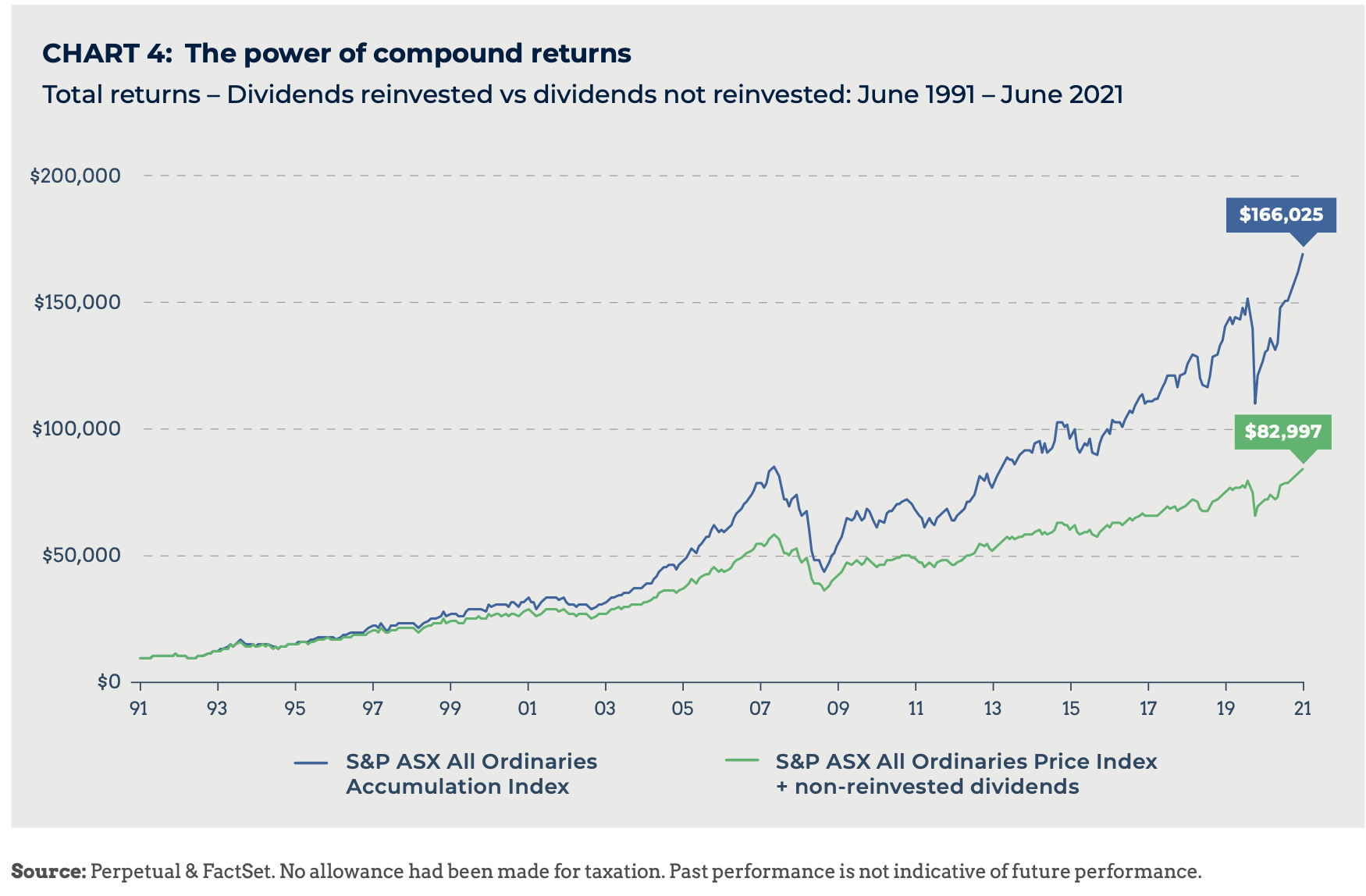
Real-world compounding
The power of compound returns can also be seen in the performance of the Perpetual Industrial Share Fund in Chart 5, below.
An investment of $10,000 in 1979 would be worth more than $1,738,000 today – if you’d reinvested your distributions.
Reinvesting is a choice
Reinvesting is a choice. Many people use investment income to meet living expenses. But as these two charts highlight, compounding can make a major difference to your returns.
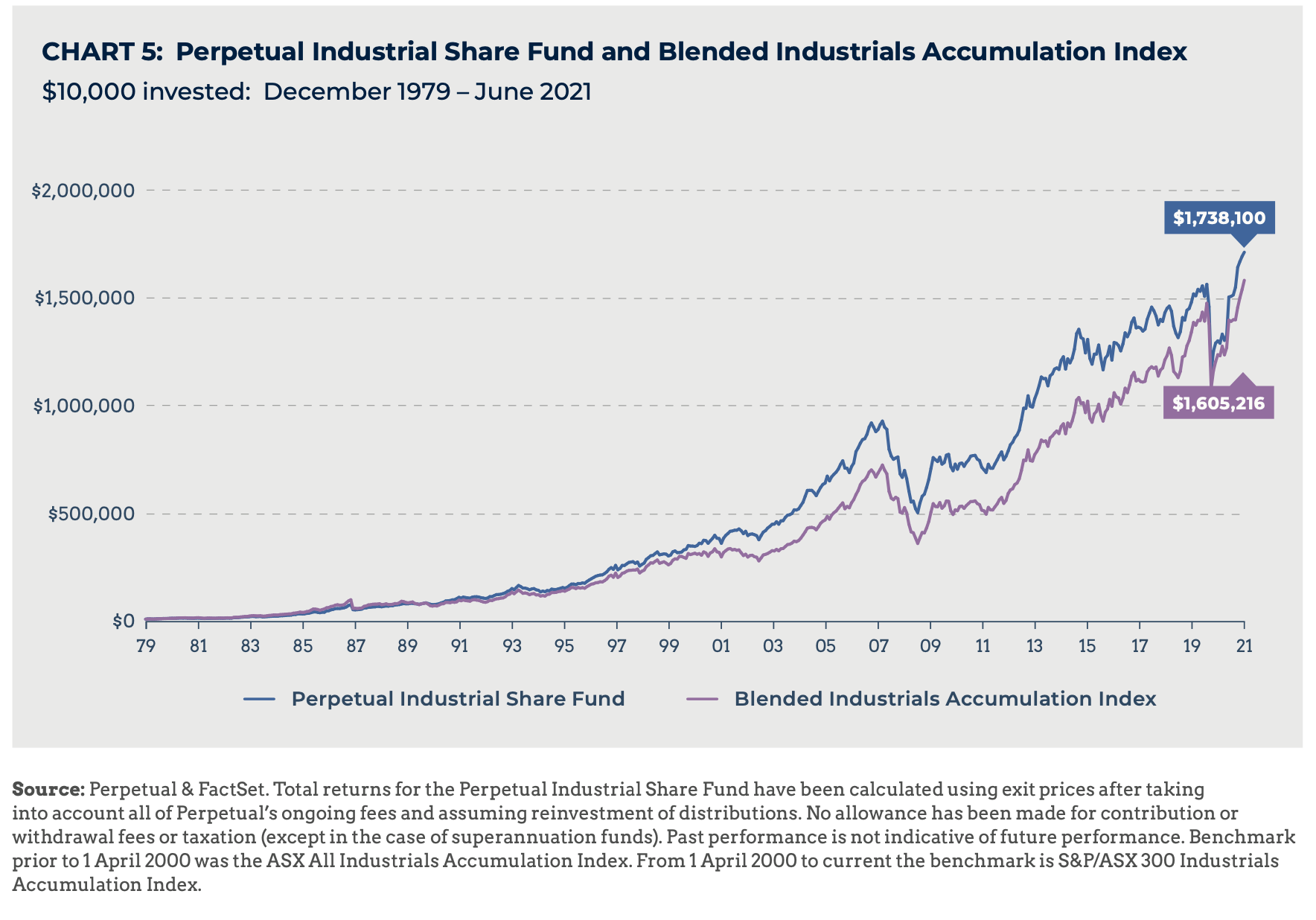
Building wealth by investing in quality businesses
To access further detail about investing in stocks – including how to manage volatility; share market risks; and investing directly in shares versus a passive approach – download The real value of investing in shares PDF here.
3 topics
1 contributor mentioned

